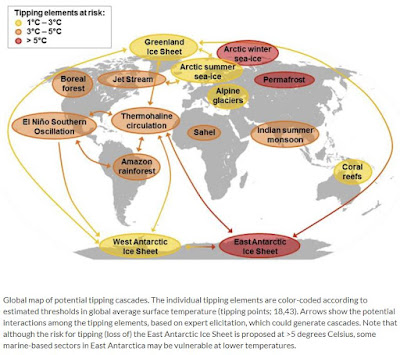If a region's active layer stops freezing consistently, consequences can be swift. Once unfrozen, soil microbes in the active layer can decompose organic material and release greenhouse gases year-round—not just in summer. And it exposes permafrost below to more heat so that layer, too, can begin thawing and releasing gases.Thawing permafrost is a positive feedback I don't like to think about.
Meanwhile, Robinson Meyer refers to Malcolm Turnbull's defeat in Australia over a climate bill as indicative of a worrisome pattern.
Moderate national leaders—on both the center-left and center-right—in some of the world’s richest and most advanced countries are finding it far easier to talk about climate change than to actually fight it.
Every country except the United States supports the Paris Agreement on climate change. But no major developed country is on track to meet its Paris climate goals, according to the Climate Action Tracker, an independent analysis produced by three European research organizations. Even Germany, Japan, and the United Kingdom—where right-wing governments have made combating climate change a national priority—seem likely to miss their goals.Update (September 5): The 2018 Report of the Global Commission on the Economy and Climate argues that the next 2 or 3 years are a critical window for upcoming investment and policy decisions.
The next 10-15 years are a unique ‘use it or lose it’ moment in economic history. We expect to invest about US$90 trillion in infrastructure to 2030, more than the total current stock. Ensuring that this infrastructure is sustainable will be a critical determinant of future growth and prosperity. The next 10-15 years are also essential in terms of climate: unless we make a decisive shift, by 2030 we will pass the point by which we can keep global average temperature rise to well below 2C.Update (September 11): The EPA is proposing to reverse restrictions on methane.
The agency estimated that energy companies would pay $530 million [on the monitoring and repair of methane-leaking wells] by 2025 under Obama’s rules but save $484 million by the same year if the [administration] proposal is implemented.Update (September 12): Kevin Zeese and Margaret Flowers from PopularResistance.org promote #RiseForClimate.
Update (September 13): William Rivers Pitt explains the concern over the EPA proposal.
The preponderance of methane in our atmosphere lubricates the rails for the nightmare runaway freight train bearing down on us all. Carbon dioxide is dangerous enough, but methane puts it in deep shade when it comes to environmental damage.
Faced with these challenges, a wise person would immediately take active steps to ameliorate the danger. First and foremost, one would think, would be to do everything possible to curb human-created methane emissions wherever and whenever it can be done. This would seem to be simple common sense, enlightened self-interest on both a local and planetary scale. The president of the United States of America is not a wise man.Update (September 19): A carbon tax would be hard to establish and probably won't solve the problem.
Scientists are beginning to realize that there are physical limits to how efficiently we can use resources. Sure, we might be able to produce cars and iPhones and skyscrapers more efficiently, but we can’t produce them out of thin air. We might shift the economy to services such as education and yoga, but even universities and workout studios require material inputs. Once we reach the limits of efficiency, pursuing any degree of economic growth drives resource use back up.
These problems throw the entire concept of green growth into doubt and necessitate some radical rethinking. ... We are nowhere near imposing a global carbon tax today, much less one of nearly $600 per metric ton, and resource efficiency is currently getting worse, not better. ... [E]ven if we do everything right, decoupling economic growth with resource use will remain elusive and our environmental problems will continue to worsen.Update (September 30): A draft environmental impact statement from the National Highway Traffic Safety Administration assumes a nearly 7 degree Fahrenheit rise in mean global temperature by 2100. Michael MacCracken:
The amazing thing they’re saying is human activities are going to lead to this rise of carbon dioxide that is disastrous for the environment and society. And then they’re saying they’re not going to do anything about it.



